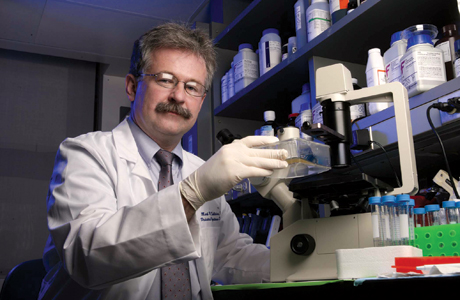Immunology and Infectious Disease
At the University of Minnesota, research in immunology and infectious disease are both globally recognized for their pioneering work and broad range of research.
Immunology and infectious disease continue to be at the forefront of research here at the University of Minnesota Medical School.
Our infectious disease experts evaluate and implement interventions to prevent illnesses and death from occurring by existing and emerging infectious diseases both locally and internationally.
In addition, the Center for Immunology has risen to become one of the top immunology research institutions in the world. Work in the development of the immune system and immunodeficiencies here at the Medical School dates back to the 1960s–70s.
Current research strengths include a variety of topics, such as:
- Immune deficiencies in children
- Epidemiology and transmission of viral infections including herpes viruses
- Immune suppression caused by HIV
- The role of small RNAs in patients with Lyme disease and tuberculosis.
IMMUNOLOGY & INFECTIOUS DISEASE RESEARCH ACROSS THE U
Department of Microbiology & Immunology
Scholars in the department are committed to discovering and disseminating knowledge about the microbial world.
Center for Immunology
The Center for Immunology is an interdisciplinary unit at the University of Minnesota devoted to advancing the field of immunology and educating future immunologists.
Infectious Diseases & International Medicine
Faculty manage programs in clinical care, education, and research at five teaching hospitals associated with the University of Minnesota Medical School.
Rheumatic & Autoimmune Diseases
The division searches for a cure for a variety of immunological and inflammatory diseases that affect a wide range of organ systems.
University of Minnesota Institute on Infectious Diseases
The University of Minnesota Institute on Infectious Diseases (UMIID) brings together University of Minnesota expertise across disciplines to discover better responses to pandemics, life-threatening infections and antimicrobial resistance through basic, translational, and clinical research.
IDENTIFYING RNA MOLECULES FOR EARLY CANCER DETECTION

Professor and Head of Biomedical Sciences Lynne Bemis, PhD, focuses on identifying novel RNA molecules as biomarkers for earlier cancer detection, specifically in ovarian cancer and melanoma.
In addition to her work in cancer biology, Bemis is interested in the role of small RNAs in infectious disease.
She is currently studying small RNAs expressed in patients with Lyme disease and with tuberculosis.
DEVELOPING VACCINES FOR INFECTIOUS DISEASES

Mark Schleiss, MD, professor in the Department of Pediatrics and director of pediatric infectious diseases, has received awards for his work and is a member of various research societies. He focuses on the study of CMV (Cytomegalovirus) vaccines, immunopathogenesis, and placental infection.
Currently, Schleiss’ lab is using animals to evaluate the extent of protection the maternal-placental-fetal unit provides against CMV. Schleiss was also named one of the Best Doctors in America from 2011-2013.